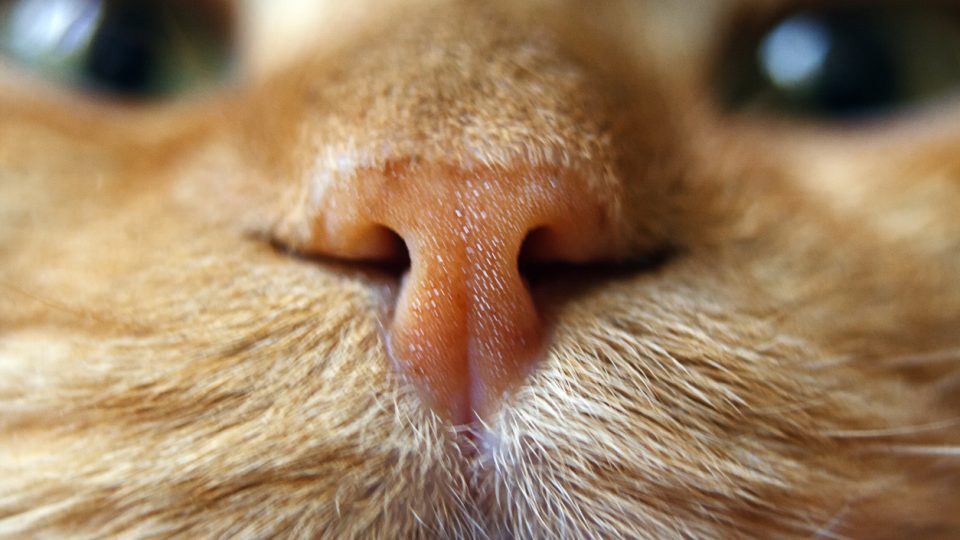Just like people, cats can have runny noses—and it’s just as uncomfortable. Cat snot can come in different colours like clear, yellowish, green, or even bloody. It can also have different textures, from thin and watery to thick and sticky. Sometimes, the discharge comes from just one nostril or both.
Usually, cats get a runny nose because of allergies, inflammation, infection, or illness. Sometimes, a minor infection will go away by itself, but if the symptoms don’t improve or get worse, you should take your cat to the vet.
Here are some reasons why your cat might have a runny nose and how to treat it, prevent it, and know when to see the vet.
What Causes Cat Runny Noses?
“A runny nose is caused by irritation or inflammation of the nasal passage,” says Dr Preston Turano, DVM and veterinary advisor at Felix Cat Insurance. Various conditions can lead to nasal irritation or inflammation, ranging from minor to more severe.
1. A cold
The most common cause of nasal discharge in cats is an upper respiratory infection, or a cat cold. Usually, viruses like herpes or calicivirus are the cause, but sometimes bacteria or fungi can also cause problems
This happens frequently to cats living in shelters or homes with multiple kitties. Usually, a cat’s cold or flu goes away in about a week.
2. Allergies
Cats can be allergic to many irritants in the air, such as pollen, dust, mould, and perfume.
Along with a runny nose, allergies tend to cause:
- red, watery eyes
- coughing
- sneezing
- wheezing
- pawing at the face
3. Inhaled irritants
Toxins from cleaners, poisonous plants, candles, or air fresheners can irritate and inflame your cat’s nose.
4. Foreign body
If a cat inhales something from the environment, such as a seed or grass awn, it could cause a runny, or even bloody, nose.
5. Nasal Polyps
Polyps are benign, but they can grow and cause nasal obstruction.
6. Trauma
If your cat’s nose gets injured, it could damage the nasal passages and lead to a runny nose. If the nose gets infected, it might turn yellow-green and require an antibiotic.
7. Dental disease
If a tooth or gums get infected, the germs can spread to the nose, making it runny. Sometimes, advanced gum disease can create a hole between the mouth and nose, which keeps the nose running.
8. Nasal cancer
While rare, nasal cancer can start as a runny nose. After, it progresses with a thick, coloured discharge, congestion, facial swelling, and pain.
Do I Need to Take My Cat to the Vet?
Dr Turano says you need to take your cat to the vet if there’s:
- excessive discharge that’s not stopping
- yellow, green, or bloody discharge
- other symptoms
In cases of bloody discharge, trouble breathing, or congestion, see a vet within 24 hours.
What Symptoms Come With a Runny Nose?
Dr Turano says this depends on the underlying cause of the runny nose. Some common symptoms you might notice with a runny nose include:
- sneezing
- eye discharge
- fewer meals (when cats can’t smell their food, they often lose interest)
- lethargy
- trouble breathing (panting, gurgling, snoring)
How Do Vets Diagnose a Runny Nose?
First, your veterinarian will perform a general exam of your cat and discuss the symptoms you’ve seen. “It is important to check the oral cavity and look for swelling or bad teeth that could be related to runny nose,” adds Dr Amanda Chambers, DVM at Embrace Pet Insurance.
Often, a visual exam is all that’s necessary. However, depending on the exam findings, your vet may try other tests, including:
- Bloodwork: to check for signs of respiratory infections.
- Radiographs: Dr Chambers says this imaging technique can help spot invasive nasal tumours, lung issues, or metallic foreign bodies.
- Rhinoscopy: your vet can insert a tube-like instrument with a camera and light into the nose while your cat is under sedation.
- Cytology or culture: sample nasal cells and discharge are collected and examined under a microscope.
- CT scan: this advanced imaging can be useful for diagnosing polyps, nasal tumours, or finding foreign objects.

iStock/SbytovaMN
What Are the Treatments For a Cat’s Runny Nose?
Runny nose treatment depends on the cause. Dr Turano says some conditions may require no treatment at all. If your cat is otherwise feeling and behaving normally, monitor them for a couple of days.
Other treatments might include:
- antibiotics, antivirals, or antifungals for infections
- over the counter allergy meds like Benadryl
- steroids
- polyps surgery
- oral surgery
- radiation for nasal cancer
Additionally, Dr Chambers says a humidifier or taking your cat into the bathroom while you shower can help break up mucous and make recovery more bearable. You can also use a towel and warm water to gently wipe away discharge and crusting.
How To Prevent a Cat’s Runny Nose
Keeping your cat healthy is a good place to start. Take your cat to the vet regularly and stay up-to-date on their vaccinations.
If the cost of vet care is too high, buy a pet insurance plan with a wellness add-on that covers annual checkups and vaccines.
Inside your home, try to get rid of things like perfumes, dust, and strong-smelling cleaners that might bother your cat. Also, use low-dust, unscented litter to help limit irritation.



